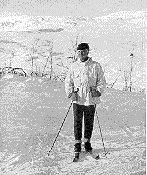| Profile | Major Works | Resources |
Johan Henryk Åkerman, 1896-1982.


Swedish economist, younger brother of Gustav Åkerman.
The younger Åkerman was arguably more original than his elder brother. Johan Henryk Åkerman's dissertation at Lund, Rhythmics of Economic Life (1928), announced his life-long interest in business cycle theory (e.g. 1931). There was, in his view, a strict synchronization between short and long cycles. Åkerman's attempts to formulate a theory would involve incorporating a prescient concern with an endogenous business cycle theory reliant in part upon seasonal cycles which, he argued, were correlated with and could propagate large and longer economic swings. This vision of synchronized cycles was severely critized by Ragnar Frisch (1931). Although largely ignored outside Sweden, Åkerman's "causal association" (1931) theory is a precedent to very recent work on seasonal cycles. Åkerman was also the first to identify the "political business cycle" (1947), a result for which he is better known in the Anglo-Saxon world.
Åkerman also pursued more expansive work. In his two monumental volumes on economic theory (1939, 1944), Åkerman attempted a sweeping theory of historical and structural change and how that, in turn, determines specific economic phenomena. This made him quite critical of the pure theory and the cavalier aggregation methods of the Stockholm School (see Åkerman (1953) and the subsequent debate in the Ekonomisk Tidskrift). Åkerman's works include a concern with methodology, epistemology and institutional factors that is akin to, but not superseded, by Myrdal. His work, much of it published in Swedish, German or French and often littered with his unique jargon, has had a far greater impact on the Continent than the English-speaking world.
Johan Henryk Åkerman became a lecturer at the University of Lund in 1932. A decade later, in 1943, Åkerman succeeded to Wicksell's old professorial chair at Lund (vacated when Erik Lindahl moved to Uppsala). Åkerman and his approach are sometimes characterized as the "Lund School" (as distinct from the "Stockholm School"). His older brother, Gustav Åkerman, was holding the chair in Gothenburg.
|
Major Works of Johan Henryk Åkerman
|
|
HET
|
|
Resources on Johan Henryk Åkerman |
All rights reserved, Gonçalo L. Fonseca
